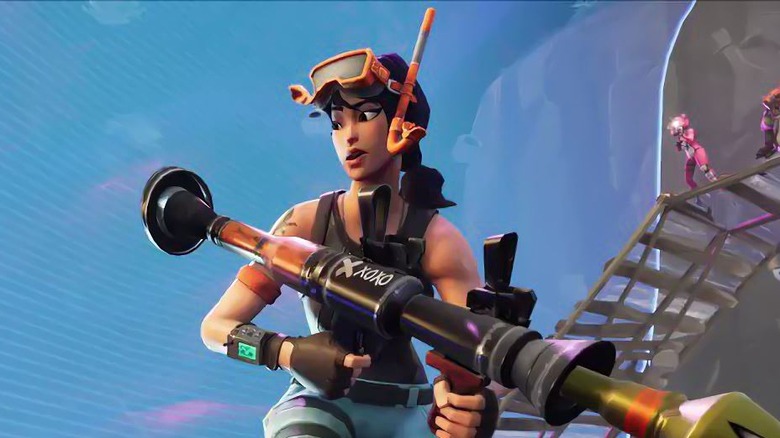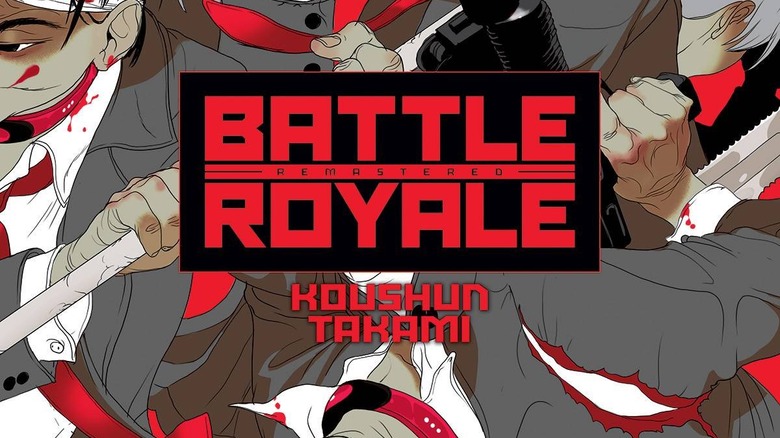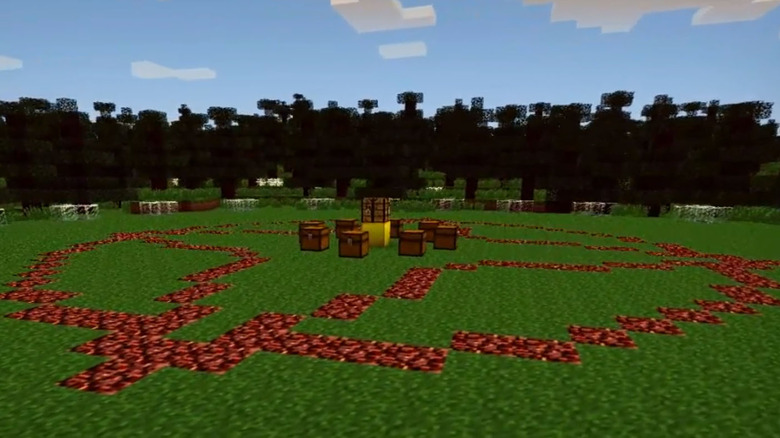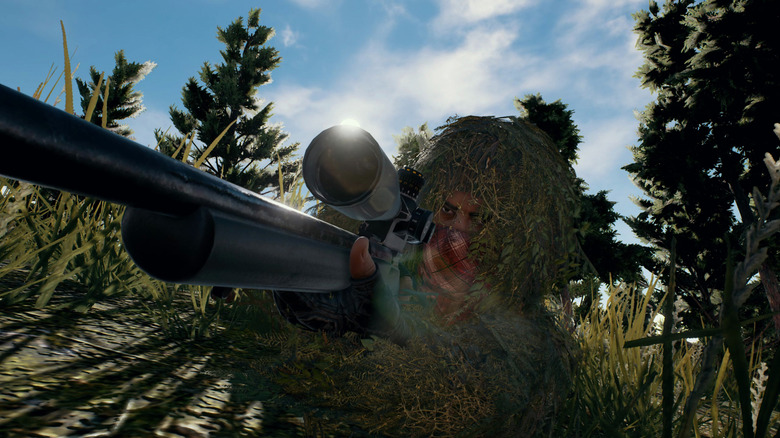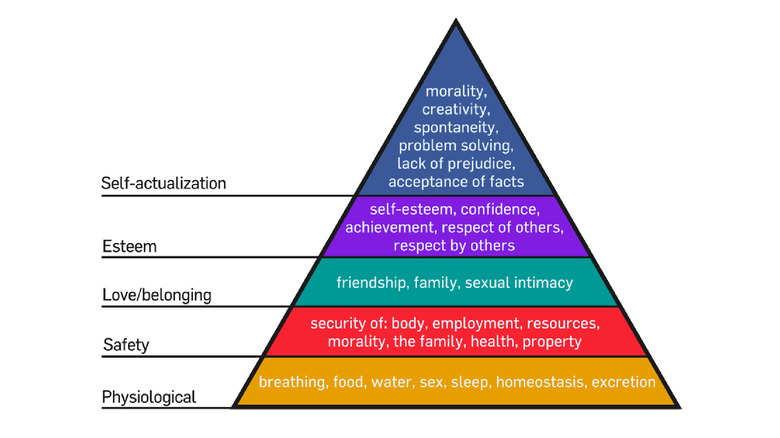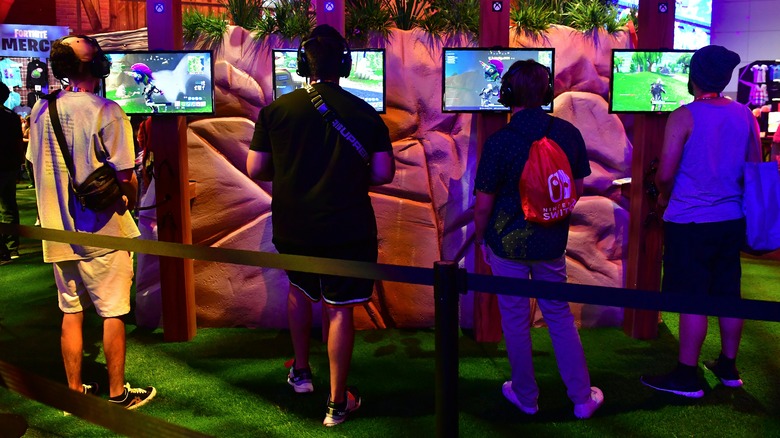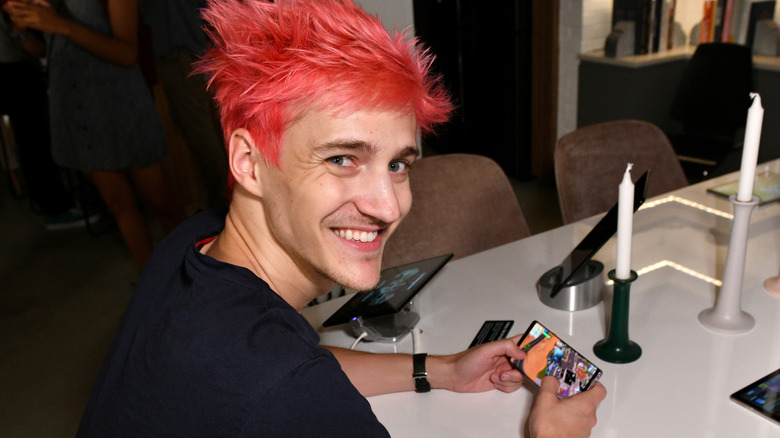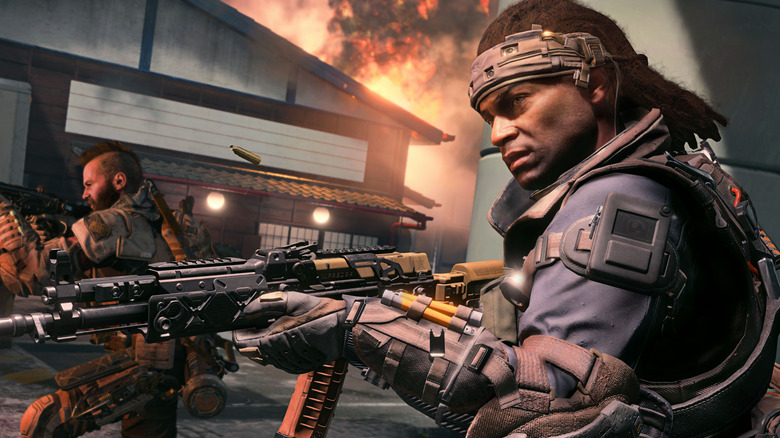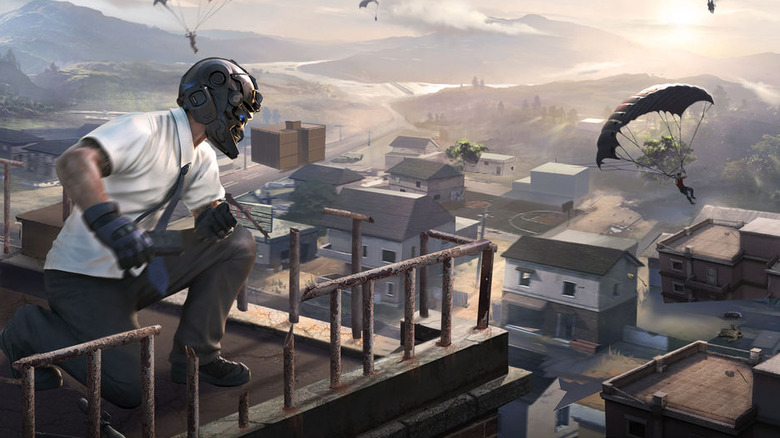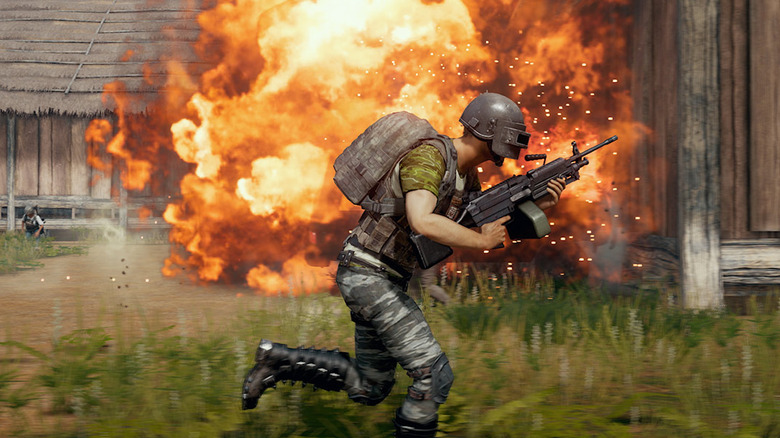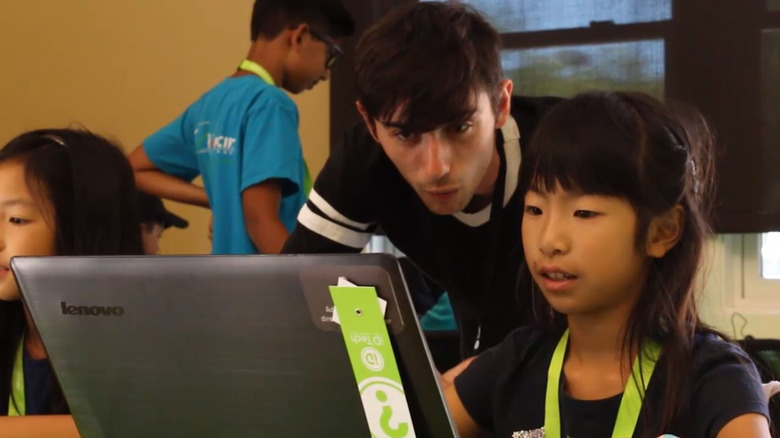The Untold Truth Of Battle Royale Games
Face it. If you play games in the late '10s, you're going to run across a battle royale title. That's just the way it is. Maybe you're already swept up in the Fortnite craze. Maybe you were a DayZ or H1Z1 ace back before PlayerUnknown's Battlegrounds took the world by storm. Maybe it'll happen when you fire up the latest versions of Call of Duty or Battlefield and hop online for some multiplayer. Maybe you're a Cyanide & Happiness fan who'll use Rapture Rejects to get your fix, or maybe you'll find the parkour-and-zombies game Dying Light: Bad Blood more your speed.
It doesn't matter. Sooner or later, you're going to end up on a battleground with your holster empty, with the map wide-open in front of you, and with every other player in the game gunning for you in hopes of being the last man standing. So, you might as well do your research. Where did the genre come from? What does the future hold? Why are these games so dang popular? The answers to these questions aren't always as straightforward as you think, so read on. When the competition is this fierce, it never hurts to be prepared.
The book that became a movie that became a genre
It all started with a book. Yeah, a book, not a movie. In 1996, a Japanese journalist named Koushun Takami quit his job and wrote Battle Royale, a novel that fuses Lord of the Flies with Tarantinto-like violence. In the world of Battle Royale, Japan has become a fascist state that shows its power by kidnapping classrooms full of middle schoolers, dropping them on remote and empty islands, giving them random weapons, and forcing them to kill until there's only one teen left standing.
Battle Royale is a chilling read. Maybe a little too chilling. In 1997, before publication, Battle Royale was dropped from final round of the prestigious Japan Grand Prix Horror Novel contest on the basis of its content. Just a few months prior, a 14-year-old student murdered an adolescent peer and left the victim's severed head behind for his classmates to find. The same teen also admitted to beating a schoolgirl to death, and attacking another one. The similarities were just too much for judges, and Battle Royale was disqualified.
It was only a minor setback. Battle Royale found a publisher anyway, and when it came out in 1999, it was an instant hit. A year later, Kinji Fukasaku's cult-classic feature film adaptation hit and made Battle Royale an international name, and a decade or so after that, Brendan "PlayerUnknown" Green used the movie as the basis for a brand new type of video game.
How Minecraft created its biggest rival
Battle Royale might've given the genre its name, but it's Suzanne Collins' blockbuster YA series The Hunger Games that produced the first real battle royale game — along with some help from something called Minecraft.
Remember Minecraft? The video game that kids everywhere were going crazy about before Fortnite: Battle Royale arrived? Yeah, as it turns out, Mojang's uber-popular build-whatever-you-want sandbox helped birth the title that ended up pushing it out of the limelight. The first Hunger Games book came out in 2008, while the first film adaptation arrived in 2012. Minecraft, meanwhile, hit early access in 2009 and got its first full release in 2011. The timing couldn't be more perfect. It didn't take long for people to start making "Survival Games" mods — no trademark infringement here! — for Minecraft, creating a whole new type of game in the process.
Now, there had been "Last Man Standing" game modes for a while. Early first-person shooters like Quake had 'em. Unreal Tournament did, too. But Survival Games was different. It wasn't just about killing your opponents. As in The Hunger Games, competitors needed to race for the best weapons, stock up on supplies, and only then go into battle. In other words, "Survival Games" was a battle royale title. We just didn't call it that yet.
Enter PlayerUnknown
Brendan Greene didn't set out to become a game developer. In fact, for a long time, he wasn't interested in games at all. "I was a photographer, a DJ, a designer," Greene tells GamesIndustry.biz. "Those were my careers." That changed when Greene discovered DayZ, an open-ended zombie-themed mod for the military simulator Arma II. "I just fell in love with that game because... you could do whatever the hell you want," Greene says. He adopted the username PlayerUnknown and went to town.
Before long, he was modding the mod in an attempt to bring Battle Royale's madcap action to players around the world. He succeeded. Unlike "Survival Games," DayZ: Battle Royale drops weapons and supplies in random spots around the map, and with exploration added, the final piece of the battle royale genre fell into place. DayZ: Battle Royale ended up being popular enough that, when the time came, Greene moved the mod to Arma 3. Later, he worked with Sony Online Entertainment (now known as Daybreak) to create H1Z1's "King of the Kill" mode.
However, it's PlayerUnknown's Battlegrounds, which Greene developed with MMO juggernaut Bluehole, that's Greene's magnum opus. "This is my final vision of what Battle Royale should be," Greene says, describing PUBG. Not that Greene thinks the genre is finished, of course. Even with all of his success, Greene hasn't forgotten his roots, and PUBG is extremely mod-friendly. The 41-year-old Irishman says, "I want to find the next PlayerUnknown."
Why battle royale games are so satisfying, according to science
People have a number of theories as to why battle royale games took off so fast, but one academic has a rather unique explanation. According to Rogelio E. Cardona Rivera, professor of entertainment arts at the University of Utah, battle royale games are a hit because they satisfy a number of our psychological needs. Like, all of them.
While speaking with Wired, Rivera invokes Maslow's Hierarchy of Needs, which reduces human drives to a simple pyramid. At the bottom of the pyramid are basic needs like food, water, sleep, and shelter. A little higher up, you'll find social needs, followed by "ego," i.e. "self-esteem, power, recognition, [and] prestige," and at the very top, "self-actualization," which encompasses things like philosophical musings and creative expression. In Maslow's model, human beings can only reach the pyramid's upper levels once the bottom ones are satisfied.
Rivera says that battle royale games hit all five levels of the pyramid. The genre's survival game trappings — combat, exploration, resource gathering, etc. — mimic the satisfaction you get at the pyramid's lower stages, while the multiplayer focus helps satisfy your social urges. Placing high-up on the leaderboards or securing a Victory Royale feeds your ego, and devising new strategies serves as a form for self-expression. It's not a perfect model, but as a way to explain the genre's appeal? Yeah, that'll work.
Battle royale players aren't like other players
In part, you can chalk the genre's success up to the games themselves, many of which have just enough luck involved to make them feel kind of like gambling. As a study by NewZoo shows, however, battle royale games also tend to attract a different, more dedicated type of player: one who's happy to shell out some extra cash to support their gaming habit.
NewZoo surveyed battle royale fans aged 10 through 65 in 16 different countries, and when the results are compared to those of people who play other competitive multiplayer games — think Overwatch, Call of Duty, Hearthstone, League of Legends, and so on — the numbers are pretty striking. While 75% of regular players invest in their gaming habit, that figure rises to 88% when you're talking about people who favor battle royale games, even though most of the big battle royale games are free. That's hardly a surprise. After all, sales of gaming headsets didn't spike all on their own.
There are some other big differences between the two groups, too. Battle royale aficionados are more engaged than their fellow gamers, and they consume much more game-related video content. They make more, too. In fact, just over half of battle royale players have streamed their gameplay sessions online in the past six months. For other gamers, that figure drops to a mere 31%.
Battle royale and streaming, a match made in heaven
Without streamers, it's hard to imagine battle royale games becoming as big as they have. The two practically go hand in hand, and the people behind the games know it. "I owe a lot of my success to Lirik on Twitch," Brendan "PlayerUnknown" Greene says in an interview with Gamesindustry.biz, "and the fact that he played my game pretty consistently for about three years."
Greene is talking about Saqib "LIRIK" Zahid, of course, a streamer who built his 2.2 million-strong audience through a steady diet of DayZ: Battle Royale. He's hardly alone. In September 2018, Fortnite and PUBG were two of the most-streamed games on Twitch. In fact, more people streamed those two games than the rest of the top ten combined. In part, it's a matter of timing. Twitch launched as an esports-focused spin-off of the general purpose livestreaming site Justin.tv in 2011, Minecraft's "Survival Games" hit it big sometime around 2012, and DayZ: Battle Royale arrived in 2013. The livestreaming and the battle royale genre grew up together. No wonder they're inseparable.
It helps that battle royale games are particularly streamer-friendly, too. Greene notes that battle royale games have a lot of downtime, giving streamers plenty of chances to chat with their audience. When they're not racking up victories, streamers like Ninja rely on trick shots, stunts, comedy bits, and other "shenanigans" to keep viewers entertained. Battle royale streams aren't just exciting, they're also fun to watch.
The numbers don't lie — but they are a little misleading
Here's how fast the battle royale genre is growing. In 2017, battle royale games made $1.7 billion in revenue. That's pretty good, but experts say that things are going to get even better. According to estimates from video game market analysis firm SuperData Research, battle royale games are going to bring in $12.6 billion by the end of 2018. By 2019, SuperData says, they'll be generating a whopping $20 billion a year. That's a lot, right?
Absolutely, but let's back up a little. Yes, battle royale games are huge, but you've got to dig a little deeper to see out what's really going on. See, when calculating its figures, SuperData included any game that has a battle royale component. That means that the 2018 installments of established franchises like Call of Duty and Battlefield, which are shipping with battle royale modes for the very first time, are suddenly getting lumped in with dedicated battle royale games like PUBG, Fortnite, H1Z1, and The Darwin Project.
As a result, the numbers are a little inflated. In 2017, the battle royale-free Call of Duty: WWII earned a cool $1 billion all on its own. Battlefield didn't get a new entry that year, but Battlefield 1, which also lacks a battle royale mode, continued to perform quite well. Games like Fortnite are going to make a ton of money, but the breathless hype about the genre's growth? It might be a little overstated.
They're called "chicken eater" games in China (and other fun facts)
The relationship between China and battle royale games is best summed up like this: it's complicated. In that country, battle royale titles are so popular that they have their own special name, "chicken eating games," which is derived from PlayerUnknown's Battlegrounds famous victory cry, "Winner, winner, chicken dinner." The nation is also full of PUBG knock-offs, and if you want some cheats, China is the place to go.
On the other hand, the Chinese government doesn't approve of the genre. At all. In October 2017, the China Audio-Video and Digital Publishing Association condemned PUBG (and, by extension, pretty much every other battle royale title) after consulting with the State Administration of Press, Publication, Radio, Film and Television, the government agency that determines what can and can't be published in China. According to the CADPA, PUBG deviates too far from "socialist core values and traditional Chinese culture and ethical norms."
The condemnation didn't stop PUBG Corp from trying to crack the Chinese market anyway, though. A few days after the CADPA's condemnation, Bluehole and Tencent announced that they'd be bringing PUBG to the country, and a month later, the two companies made a deal with the Chinese government. A modified version of the game that emphasizes teamwork and other socialist values arrived in February 2017, but the saga didn't end there. Tencent still hasn't gotten approval to make actual money from PUBG, affecting its stock price. So, yeah. Complicated.
Can you copyright a genre?
Epic Games isn't shy when it comes to talking about where the ideas for Fortnite: Battle Royale came from: the people at Epic played PUBG, liked it, and decided to recreate it in Fortnite. It's as simple as that. A year later, Fornite is booming, PUBG continues to lose players, and onlookers wonder why Bluehole and PUBG Corp don't sue Epic into oblivion.
After all, Bluehole clearly thinks it has legal ownership to pretty much everything that makes battle royale games unique. When Bluehole took NetEase to court, it provided a list of "copyrightable audiovisual subject matter" that appears in Battlegrounds. It's a doozy. Bluehole contends that it has a copyright on all kinds of common game mechanics, including pre-game lobbies, kicking off matches with "air jumps" from planes or battle buses, and what Bluehole calls "shrinking gameplay" — i.e., herding players into increasingly small sections of the map. Heck, they even lay claim to frying pans.
The US Copyright Office, though, thinks differently. You can't copyright "the method or methods for playing" a game, the government says, and "once a game has been made public, nothing in the copyright law prevents others from developing another game based on similar principles." Besides, Bluehole actually did sue Epic for copyright infringement in Korean courts, but ended up dropping the suit a month later. In the aftermath, nothing visibly changed. So, can you copyright a genre? From the look of things: probably not.
The future of battle royale has already begun
For his part, Brendan "PlayerUnknown" Greene doesn't have a problem with other people making battle royale games. "I want this genre of games to grow," Greene says to the BBC. "For that to happen you need new and interesting spins on the game mode ... If it's just copycats down the line, then the genre doesn't grow and people get bored."
Well, good news, Mr. Unknown: the next generation of battle royale developers is already hard at work. In summer 2018, iD Tech, a company that runs summer programs for tech-savvy kids, held a series of Fortnite summer camps, and if you think that all that iD's students did was play video games all day, think again. Fortnite might be in the name, but the camp is actually designed to teach kids more general computer programming techniques. Using Epic's Unreal Engine — the same tech that powers Fortnite, PUBG, and many of your other favorite games — and assets from Paragon, the free-to-play MOBA that Fortnite accidentally killed, campers put together their very own battle royale games.
ID's Ricky Bennett says that every kid builds a "condensed version of Fortnite," but the innovation doesn't have to stop there. If campers are motivated and "want to push forward and do something awesome," iD will help make it happen. So, keep an eye out. You never know when one of those campers will inadvertently create the biggest genre in gaming.

